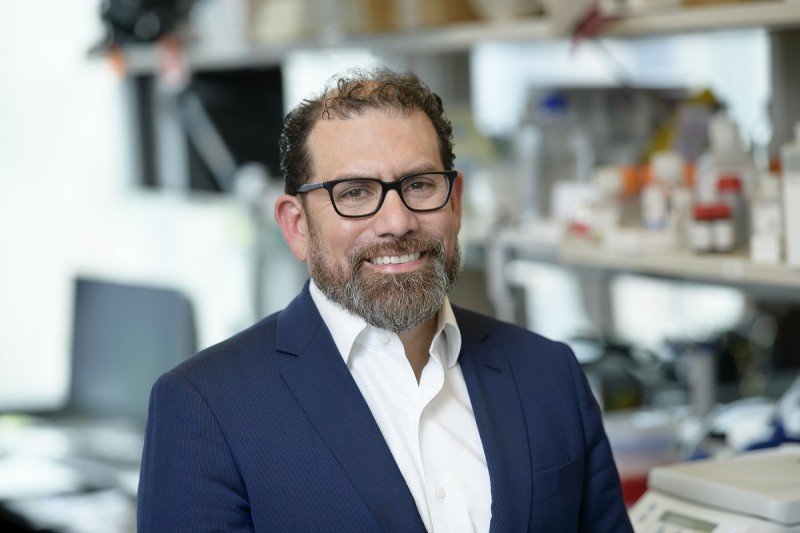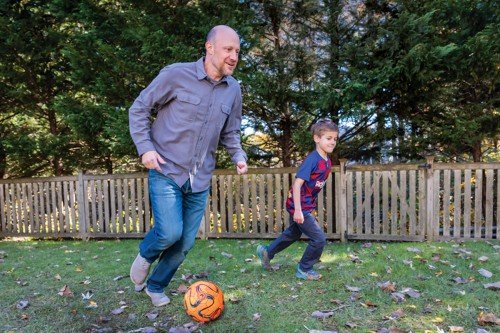
Luis Alberto Diaz, Jr., has dedicated his life’s work to addressing some of the most pressing challenges in cancer research — driven by one clear aim.
“When I entered medicine, there were many beautiful areas of study that offered opportunities to explore unknown questions, like neurology and psychiatry,” he explains. “In the end, the one that stuck out was cancer. My choice was about unlocking the unknowns of this disease and ultimately helping to end people’s suffering.”
Search for the ‘Key’
Dr. Diaz’s quest to find the keys that unlock cancer began in the early aughts. Over the years, his search has led to several game-changing results in cancer research — including a first in oncology.
The Food and Drug Administration (FDA) in May 2017 approved an immunotherapy for cancers that share a genetic abnormality called mismatch repair (MMR) deficiency. This was a landmark event in oncology, representing the first time that a drug was approved based on a specific genetic profile rather than where the cancer originated.
The FDA approved the immunotherapy based on results of a clinical trial that Dr. Diaz’s team led while he was a faculty member at John Hopkins.
“If you start with our clinical trial and move to today, at each step the therapy works better and better,” he says. “We started with the most advanced stage of the disease, when patients were in hospice, and their tumors were disappearing and gone. Then we moved to advanced and first-line, when metastatic cancer is first diagnosed.” More recently, studies have moved on to treatments before surgery to shrink tumors and to therapy afterwards, to reduce the risk of recurrence.
“Now, we’re faced with a new set of questions: Could the therapy work on people who are high-risk before the cancer even develops? What about even pre-diagnosis? To me, this is very exciting because it alters the course of how we treat cancer and redefines anti-cancer therapeutics,” he says.
Presidential Nod
Dr. Diaz also is eager to pose questions to his fellow distinguished National Cancer Advisory Board (NCAB) members.
In September 2021, President Biden appointed Dr. Diaz to the NCAB, which plays a critical role in determining the future of the nation’s cancer research program. Its primary task is to advise the secretary of the Department of Health and Human Services; the director of the National Cancer Institute (NCI); and, ultimately, the president on a range of cancer issues.
“I’m very excited to represent MSK and all the constituencies to help make the best decisions for cancer care and research,” he says.
During his six-year term, Dr. Diaz hopes to help the NCAB address cancer health disparities that persist in socioeconomically disadvantaged communities across the US.
“Cancer doesn’t affect everyone equally,” he explains. “We need to have a national conversation about how we can work together to break down barriers and improve cancer care and outcomes for the most vulnerable groups.”
The NCAB complements the efforts of the Cancer Moonshot initiative launched during the Obama administration — and celebrates all that’s been learned since the National Care Act was signed in 1971.
According to Dr. Diaz, some of the greatest cancer advancements in past 50 years include “understanding what cancer is — the blueprint of cancer. Then, the advent of chemo and other targeted therapies, such as engineered cellular therapies,” he says, noting that there is still much promise in precision medicine.
Fast-forward to the past decade, when physician-scientists have gained deeper insights into what causes cancers and a person’s risk for developing the disease.
“We’re beginning to intervene earlier and earlier in how we treat and fight cancer,” Dr. Diaz explains. “Moving forward, our goal is that, with behavior modifications and interventions, we can change the natural history of cancer.”
“The future of oncology is always evolving,” he adds. For example, researchers today have an unprecedented view of the genetic changes that cause cancer, thanks to the genomic sequencing of cancer and cancer types.
“This is an awesome challenge and opportunity: What to do with this sea of information and how to pick out what is important,” he says.
‘Like Bandmates’
Questions such as “What’s next?” and “What’s possible?” are what fuel Dr. Diaz’s passion for cancer genetic research and his enthusiasm for working with his MSK colleagues.
“Collaboration is like working on a song with bandmates,” he says. “It’s an iterative process. You’re riffing off of each other. When you fine-tune an idea, that’s when you begin to explore. We have gotten better and better at exploring because — as a scientific community — we know more about cancer than ever before.”
The prospect of answering these questions — and MSK’s legacy — prompted him to join MSK as Head of the Division of Solid Tumor Oncology in 2017.
“There are very few opportunities to work at an institution with as much history as MSK,” he says. “Here, you can answer questions and move the needle in a different way.”
So, what is the advice he shares with his trainees?
“Have a passion for doing something that is special and never been done before.”



